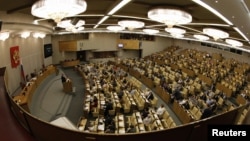The European Parliament has expressed deep concern about the judicial system in Russia, saying there has been a recent upsurge in "politically-motivated intimidation and prosecution of opposition activists."
Thursday's statement noted the recent two-year prison sentences of three members of the punk band Pussy Riot for staging a protest earlier this year against the leadership of President Vladimir Putin. Members of the European Parliament expressed "deep disappointment" with the verdict, following statements by EU foreign affairs chief Catherine Ashton and Russian Prime Minister Dmitry Medvedev earlier this week that the sentence is counterproductive.
The members of parliament said they believe the sentence for hooliganism will be "reviewed and reversed in line with Russia's international commitments."
The statement also said the "omnipresent impunity and pervasive corruption in the country," as well as politically-motivated trials, are signs Moscow is not meeting its obligations as a member of the Council of Europe and the Organization for Security and Cooperation in Europe, or OSCE.
On Tuesday, Ashton told the European Parliament that recent moves to push legislation swiftly through the Russian state Duma [lower house of parliament] seemed aimed to "further reduce the available space for independent civil and political activity in the country."
Since Putin's reelection as president earlier this year, the Duma has adopted legislation on non-governmental organizations, demonstrations, defamation, and use of the Internet that rights groups fear could lead to a crackdown on human rights and freedom of expression.
Thursday's statement noted the recent two-year prison sentences of three members of the punk band Pussy Riot for staging a protest earlier this year against the leadership of President Vladimir Putin. Members of the European Parliament expressed "deep disappointment" with the verdict, following statements by EU foreign affairs chief Catherine Ashton and Russian Prime Minister Dmitry Medvedev earlier this week that the sentence is counterproductive.
The members of parliament said they believe the sentence for hooliganism will be "reviewed and reversed in line with Russia's international commitments."
The statement also said the "omnipresent impunity and pervasive corruption in the country," as well as politically-motivated trials, are signs Moscow is not meeting its obligations as a member of the Council of Europe and the Organization for Security and Cooperation in Europe, or OSCE.
On Tuesday, Ashton told the European Parliament that recent moves to push legislation swiftly through the Russian state Duma [lower house of parliament] seemed aimed to "further reduce the available space for independent civil and political activity in the country."
Since Putin's reelection as president earlier this year, the Duma has adopted legislation on non-governmental organizations, demonstrations, defamation, and use of the Internet that rights groups fear could lead to a crackdown on human rights and freedom of expression.
Some information for this report was provided by AP and Reuters.





